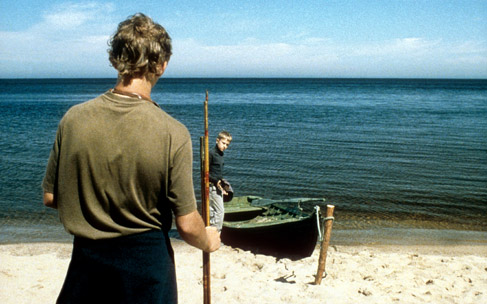The story begins by introducing us to two young brothers. Andrei (Vladimir Garin) is the older of the two, a confused teen looking for acceptance any place he can find it. Ivan (Ivan Dobronravov) is the younger, an insecure but scrappy young boy who seems overcome by his fears, but refuses to back down from them. The boys have grown up without a father in some poor, tumbledown corner of Russia. One day, out of the blue, the father they have only known from photographs returns after 12 years' absence. He tells them he is taking them on a fishing trip, and the boys' mother reluctantly agrees. What ensues is a dark, allegorical Hitchcock-style thriller pared down to its barest bones.
Why has this man (known only as “Father”) been gone for so long? Was he in jail? Why does he suddenly want to reconnect with his sons? Is this man even really their father? The Father seems to interact with his boys through a confusing mixture of neglect, abuse and fatherly concern. At times he seems genuinely interested in bonding with them. At other times, he seems horribly burdened by their presence. Andrei responds by kissing up to his father, desperate for any kind of guidance. Ivan remains stubbornly opposed to the man and disobeys him at every turn, suffering his frequent wrath.
Eventually, the Father takes his boys to a secluded, primeval island, again under the auspices of a fishing trip. But he really only seems to be on the island to recover a mysterious buried box. Is it some kind of loot? Is he using the boys as a shield? The film never gives us any solid answers, preferring to exist as a tantalizingly open-ended fable. With its beautifully murky cinematography and moody atmosphere, Zvyagintsev creates a heavy aura of mystery and foreboding over this psychological and mythical coming-of-age drama. The actors—particularly the eerily talented youngsters Garin and Dobronrovov—add to the film a powerful emotional heft.
As a director, Zvyagintsev revels in the kind of blatant Biblical symbolism that Russia has tinkered with only sporadically. (Filmmaking came into Russia just as the communist revolution got underway.) Throughout The Return are images of prodigal sons, warring brothers, all-powerful fathers, dying birds and blood sacrifices. There's also a lingering hint of Russian history. The boys' ambiguous relationship with their father certainly seems to mirror the Russian people's relationship with their “father figures” (Stalin, Lenin). On the one hand is the urge to resist the cruel yoke of authority. On the other hand is the desire to revel in the safety of a stern leader. Is Andrei and Ivan's father a callous, opportunistic crook or is he imparting some hard life lessons on his offspring? The film's bleak coda gives us a hint or two.
With its slow, arid story and stark symbolism, it's hard not to compare the film to the work of modern Russian master Andrei Tarkovsky (Solaris, Andrei Rublev, The Sacrifice). The only major difference is that, at a mere 102 minutes, The Return qualifies as a short in the realm of Russian cinema. Even so, The Return is the kind of film that will long outlast its runtime, living on in memory as a haunting, frustrating tale of elusive morality in the modern world.



